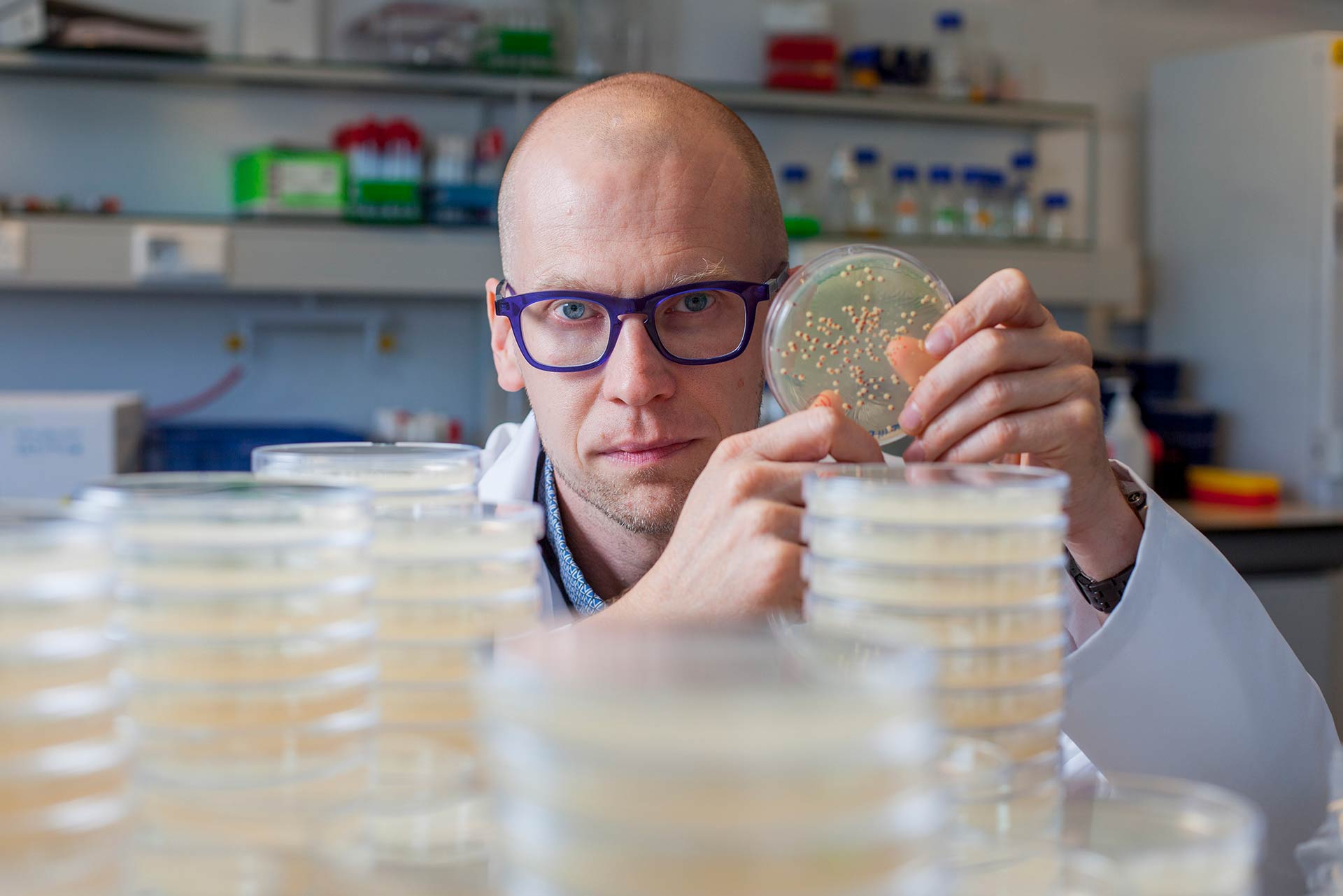Each year, the European Research Council awards Proof of Concept grants to scientists who want to take their work a step further towards concrete applications. With the 150,000-euro grant, scientific teams can explore the commercial potential and societal value of innovative ideas originating from ERC-funded research. Thanks to the support of this 18-month grant, the lab of Prof. Kevin Verstrepen has initiated the SUPERYEAST project, research which may positively impact a range of industries.
The SUPERYEAST project focuses on the so-called Saccharomyces cerevisiae, also known as traditional baker’s and brewer’s yeast. “This is the yeast species that is most commonly used in the production of food products such as beer, wine, bread and chocolate,” says Verstrepen. “The micro-organism is also used to make bioethanol, a renewable fuel that plays an important role in the energy transition away from fossil fuels, and it furthermore holds much potential for the development of pharmaceuticals.”
Well-guarded industry secrets
While it is well known that many beers are made with S. cerevisiae, big breweries are tight-lipped about which specific strains they use to make their beers. It’s a valuable industry secret, as the different yeast strains are an important part of what gives beers their distinct aromas.
“The exact information about their yeast strains is often guarded by breweries like the gold in Fort Knox,” says Verstrepen. “In general, detailed knowledge about yeasts is crucial in the art of brewing beer, because these micro-organisms have unique characteristics that can have very particular effects. When it comes to bioethanol, however, things are simpler: it’s mainly essential that the used yeast can produce as much ethanol as possible in a short time. If you would compare yeasts to human athletes, you could say that some have the traits of sprinters and others of marathon runners; that’s how different they can be.”
“The exact information about their yeast strains is often guarded by breweries like the gold in Fort Knox.” – Kevin Verstrepen, VIB-KU Leuven
Discovery of gene ‘YLR108C’
In previous ERC-funded basic research, Verstrepen’s team identified a hitherto unknown gene, which plays a crucial role in the development process of the S. cerevisiae yeast. Because the physiological function of this gene is still unclear, it hasn’t received an actual name yet. It is currently known by the code ‘YLR108C’.
“Brewer’s yeast has only around 5,000 genes, as opposed to the 25,000 of humans, and its DNA has been extensively investigated.” – Kevin Verstrepen, VIB-KU Leuven
“It was a very surprising discovery, because almost all genes of this yeast have been characterized,” says Verstrepen. “Brewer’s yeast has only around 5,000 genes, as opposed to the 25,000 of humans, and its DNA has been extensively investigated. The micro-organism has been scrutinized in great detail not only because of its commercial value, but also because scientists often use it as a research model, since its cells strongly resemble human cells.”
Speeding up the fermentation process
The newly discovered gene has turned out to be an important factor in the regulation of the ‘lag phase’ of yeasts. The lag phase is the period of time during which yeast cells acclimatize to their environment before reproducing by dividing. For industrial purposes, a shorter lag phase has great benefits, since it speeds up the fermentation process. Lieselotte Vermeersch, a PhD student working on the ERC project in Verstrepen’s team, established that some yeasts have a few mutations in YLR108C and that these mutations result in a much shorter lag phase.
“We will now use the genetic modification technique CRISPR-Cas9, known as the ‘genetic scissors’, with the aim of developing superior industrial yeasts that combine an optimal industrial fermentation performance with more efficient biomass production,” says Verstrepen. “But it’s crucial to add that, for the production of food and beverages, we will not actually produce genetically modified yeast strains. We will instead use natural breeding techniques.” The optimized yeast strains will then be tested in the pilot brewery in Verstrepen’s laboratory.
Read this BioVox article to learn more about CRISPR.
Decreasing the ecological footprint
A new yeast with natural superpowers would not only serve to increase the efficiency of various production processes but would also decrease their ecological footprint. “You would be able to produce larger volumes of products in a shorter amount of time, with smaller fermentation installations, thus requiring amongst others less energy and less cleaning water,” says Verstrepen. “In particular, if we can improve the production of bioethanol, this would also mean a big step forward in the replacement of fossil fuels and thus in the battle against climate change.”
“If we can improve the production of bioethanol, this would also mean a big step forward in the replacement of fossil fuels and thus in the battle against climate change.” – Kevin Verstrepen, VIB-KU Leuven
The SUPERYEAST project should deliver concrete results by the beginning of 2022. Commercial applications can then possibly be expected one year after that, according to Verstrepen. “We need much less time than, for example, medical developments.” Finding interested partners shouldn’t be a problem: Verstrepen’s team has in the past collaborated with many leading companies, such as AB InBev, the world’s largest brewer.
Header image: Kevin Verstrepen (courtesy of KU Leuven).


